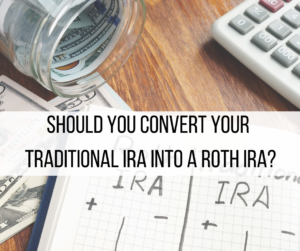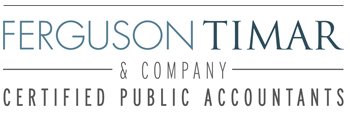
Saving for retirement takes planning and discipline. Protecting long-term savings from unnecessary taxes is a key component of any good retirement strategy. In the world of long-term savings strategies, it’s hard to beat the tax deal offered by traditional IRAs and Roth IRAs.
Many taxpayers hear about the option to convert a traditional IRA into a Roth IRA, but they don’t know what that involves or why they would want to do it. In a nutshell, a conversion can be a great way to improve the long-term tax treatment of a retirement account, but it must be done with care and in some cases may simply not make financial sense.
The tax professionals at Ferguson Timar would be happy to explain the details to you. For now, let’s look at the basics.
Comparing traditional IRAs and Roth IRAs
Traditional and Roth IRAs have many features in common. Among other things, they have the same annual contribution limits: in 2021, $6000 for those under 50, or $7,000 for taxpayers who are age 50 or older.
The accounts also have important differences. One difference is how they deliver their tax benefit:
- A traditional IRA allows the investor to defer income tax on gains in the account until they are withdrawn. For taxpayers who are in a high tax bracket today but expect to be in a much lower bracket at retirement, this is a great deal. Taxpayers who are below IRS income and filing status thresholds can also deduct all or some of their annual contributions to a traditional IRA.
- A Roth IRA does not provide a deduction for initial contributions, but gains in the account are, in most cases, not taxed upon distribution.
Because the Roth IRA functions as a “tax shelter” for investment income, many savers prefer it over a traditional IRA. Congress recognized the good deal they were offering with the Roth IRA, so they set a cap on who could contribute to them. A taxpayer’s eligibility to contribute to a Roth IRA scales with the taxpayer’s income: joint filers with less than $198,000 adjusted gross income can contribute the full amount in 2021.
Converting a traditional IRA into the “back door Roth IRA”
Even if your income disqualifies you from contributing to a Roth IRA, you have the option of converting your traditional IRA into a Roth. The transfer process is simple: the money in one account is transferred to the other. The transaction will need to be reported to the IRS on Form 8606, which gets filed with your annual tax return.
Converting a traditional IRA into a Roth IRA can trigger tax consequences. Two categories of funds become taxable income in the year of the conversion:
- Any deduction claimed in prior years on contributions to the traditional IRA.
- Any gains made on the investments in the traditional IRA account.
Here’s a simple example. Joe Taxpayer contributed $6,000 to a traditional IRA in 2020. Because he qualified, he took the deduction in 2020 for the contribution amount. His smart investment in a home décor business rapidly grew, so when he decides to convert to a Roth his account value is $10,000. In the conversion, his stock is sold and the cash moved into the Roth IRA. He will owe income tax on the taxable portion of $6,000, as well as the short-term gain of $4,000 from his investment.
As Joe Taxpayer’s example shows, a conversion can be expensive if it is not properly timed. To avoid a high tax bill like Joe’s, traditional IRAs can be converted into a Roth IRA within a short time of the initial contribution. Although at that point no tax deduction can be taken for the contribution to the traditional IRA, the account will not have a taxable gain, either, and the long-term benefits of the Roth IRA can be achieved.
Is converting a traditional IRA into a Roth IRA the right answer for you?
Ferguson Timar is here to answer your questions and guide your tax planning at every phase of life. We will work with you to ensure your retirement plan is optimized from a tax perspective. To make an appointment to speak with a member of our team, send us an email or give us a call at (714) 204-0100.
